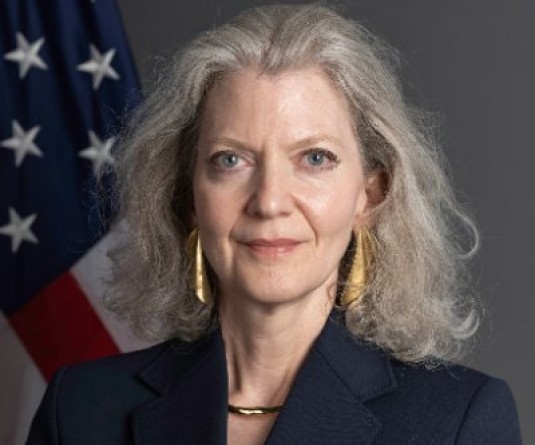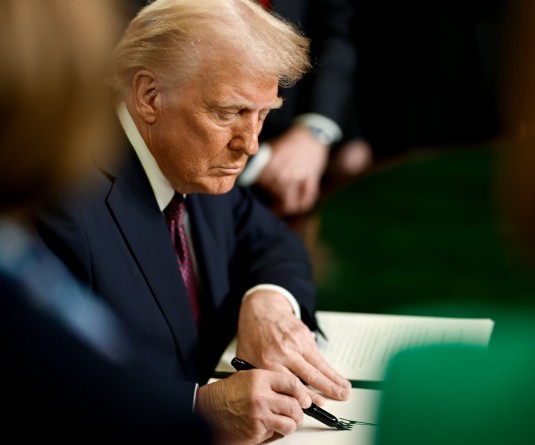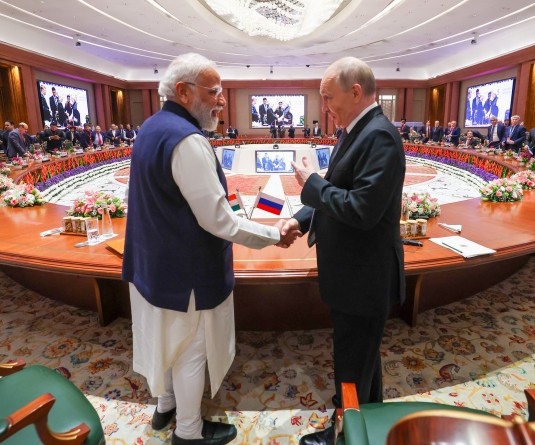
Libyan pro and anti-Gadhafi protesters fight at the street in front of the Arab league headquarters in Cairo, Egypt on Thursday, April 14. U.N. Secretary-General Ban Ki-moon chaired a meeting Thursday of international and regional organizations in Cairo to improve the coordination of the international response on Libya. (AP Photo)
BENGHAZI, April 14 (Reuters): Muammar Gaddafi's forces fired a hail of rockets into the besieged city of Misrata on Thursday, rebels said, as diplomatic disputes over Western bombing in Libya shadowed the fighting on the ground.
Rebels in Misrata, the lone insurgent bastion in western Libya, said 23 people died when at least 80 Russian-made Grad rockets were fired into a residential area. They warned of a massacre if NATO did not step up its bombing under a United Nations mandate to protect civilians.
Libya's third city has been under siege for more than six weeks and international organizations warn of a humanitarian crisis. Hundreds of civilians are reported to have died. Leaders of five so-called BRICS emerging powers -- Brazil, Russia, India, China and South Africa -- expressed misgivings about NATO air strikes after a meeting in China and urged an end to the two-month civil war.
Their criticism came amid splits within the Western alliance about whether more allies should participate to intensify bombing of Gaddafi's heavy weapons and break a stalemate. NATO foreign ministers were meeting in Berlin to seek a joint line. It also contrasted with the first joint call for Gaddafi's overthrow from a group of Middle Eastern and Western countries meeting in Qatar on Wednesday. In its strongest language yet, the international "contact group" on Libya demanded that Gaddafi leave power and expressed support for the rebels.
Four of the BRICS states -- Brazil, Russia, India and China -- abstained in a March 17 Security Council vote authorizing military action and the fifth, South Africa, voted in favor. "We share the principle that the use of force should be avoided," they said in a statement after their summit, urging a peaceful settlement of the Libyan conflict.
MEETING AT ARAB LEAGUE
U.N. Secretary General Ban Ki-moon, EU foreign policy chief Catherine Ashton, Arab League head Amr Moussa and officials from the African Union and Organization of the Islamic Conference discussed Libya in Cairo on Thursday. A few dozen pro and anti-Gaddafi protesters demonstrated outside the meeting at Arab League headquarters.
"There is no military solution to the crisis in Libya, we have to go through the peace process, the peaceful, political process," AU spokesman Noureddine Mezni told Reuters. He described the situation in Libya as a catastrophe.
The AU is pursuing its peace plan for Libya despite flat rejection by the rebel leadership in Benghazi because it did not call for Gaddafi to end his 41-year rule. A rebel spokesman in Misrata told Reuters by telephone: "A massacre ...will take place here if NATO does not intervene strongly." But the alliance itself is divided, with several members reluctant to increase the bombing.
Britain and France are leading air strikes against Gaddafi's forces, but have grown frustrated with the lack of support from their allies. After heading up the campaign in its early days, Washington -- which has specialist ground attack aircraft that could tip the balance -- is taking a back seat.
U.S. Secretary of State Hillary Clinton said at an appearance with German Chancellor Angela Merkel: "We are also sharing the same goal which is to see the end of the Gaddhafi regime in Libya. And we are contributing in many ways in order to see that goal realized." She gave no hint that Washington was willing to do more.
The ambivalence of NATO doves was illustrated on Thursday when Italian Foreign Minister Franco Frattini said his country would need convincing arguments to open fire on Libyan targets because of its fear of hitting civilians. He said Italy, whose planes are patrolling the Libya no-fly zone but have never opened fire, was particularly sensitive as Libya's former colonial power.
Spanish Foreign Minister Trinidad Jimenez, whose country was named by French officials as one that could do more, said she Madrid's contribution of five planes, which are enforcing an arms embargo and no-fly zone, but not bombing, would not change.
British Foreign Secretary William Hague called at the Qatar meeting for more allies to join attacks on ground targets and his French counterpart, Alain Juppe, urged heavier military pressure on Gaddafi's troops to convince him to leave power. But Belgian Foreign Minister Steven Vanackere said the March 17 U.N. resolution authorizing NATO action in Libya ruled out arming civilians and he saw no need to boost air power there.
The rebels said they were in talks with "friendly" countries to obtain arms: "I don't think there will be a problem getting weapons," national council spokesman Abdel Hafiz Ghoga told reporters in the rebel stronghold of Benghazi. Juppe said in Berlin that France was not currently in favor of arming the rebels and the NATO campaign would not be enough to topple Gaddafi. A political solution was essential, he said.
Qatar, a leading Arab supporter of the uprising, hinted on Wednesday that it might arm the rebels. Britain says it will supply the rebels with 1,000 sets of body armor from surplus supplies on top of 100 satellite phones already sent.
Rebels in Misrata, the lone insurgent bastion in western Libya, said 23 people died when at least 80 Russian-made Grad rockets were fired into a residential area. They warned of a massacre if NATO did not step up its bombing under a United Nations mandate to protect civilians.
Libya's third city has been under siege for more than six weeks and international organizations warn of a humanitarian crisis. Hundreds of civilians are reported to have died. Leaders of five so-called BRICS emerging powers -- Brazil, Russia, India, China and South Africa -- expressed misgivings about NATO air strikes after a meeting in China and urged an end to the two-month civil war.
Their criticism came amid splits within the Western alliance about whether more allies should participate to intensify bombing of Gaddafi's heavy weapons and break a stalemate. NATO foreign ministers were meeting in Berlin to seek a joint line. It also contrasted with the first joint call for Gaddafi's overthrow from a group of Middle Eastern and Western countries meeting in Qatar on Wednesday. In its strongest language yet, the international "contact group" on Libya demanded that Gaddafi leave power and expressed support for the rebels.
Four of the BRICS states -- Brazil, Russia, India and China -- abstained in a March 17 Security Council vote authorizing military action and the fifth, South Africa, voted in favor. "We share the principle that the use of force should be avoided," they said in a statement after their summit, urging a peaceful settlement of the Libyan conflict.
MEETING AT ARAB LEAGUE
U.N. Secretary General Ban Ki-moon, EU foreign policy chief Catherine Ashton, Arab League head Amr Moussa and officials from the African Union and Organization of the Islamic Conference discussed Libya in Cairo on Thursday. A few dozen pro and anti-Gaddafi protesters demonstrated outside the meeting at Arab League headquarters.
"There is no military solution to the crisis in Libya, we have to go through the peace process, the peaceful, political process," AU spokesman Noureddine Mezni told Reuters. He described the situation in Libya as a catastrophe.
The AU is pursuing its peace plan for Libya despite flat rejection by the rebel leadership in Benghazi because it did not call for Gaddafi to end his 41-year rule. A rebel spokesman in Misrata told Reuters by telephone: "A massacre ...will take place here if NATO does not intervene strongly." But the alliance itself is divided, with several members reluctant to increase the bombing.
Britain and France are leading air strikes against Gaddafi's forces, but have grown frustrated with the lack of support from their allies. After heading up the campaign in its early days, Washington -- which has specialist ground attack aircraft that could tip the balance -- is taking a back seat.
U.S. Secretary of State Hillary Clinton said at an appearance with German Chancellor Angela Merkel: "We are also sharing the same goal which is to see the end of the Gaddhafi regime in Libya. And we are contributing in many ways in order to see that goal realized." She gave no hint that Washington was willing to do more.
The ambivalence of NATO doves was illustrated on Thursday when Italian Foreign Minister Franco Frattini said his country would need convincing arguments to open fire on Libyan targets because of its fear of hitting civilians. He said Italy, whose planes are patrolling the Libya no-fly zone but have never opened fire, was particularly sensitive as Libya's former colonial power.
Spanish Foreign Minister Trinidad Jimenez, whose country was named by French officials as one that could do more, said she Madrid's contribution of five planes, which are enforcing an arms embargo and no-fly zone, but not bombing, would not change.
British Foreign Secretary William Hague called at the Qatar meeting for more allies to join attacks on ground targets and his French counterpart, Alain Juppe, urged heavier military pressure on Gaddafi's troops to convince him to leave power. But Belgian Foreign Minister Steven Vanackere said the March 17 U.N. resolution authorizing NATO action in Libya ruled out arming civilians and he saw no need to boost air power there.
The rebels said they were in talks with "friendly" countries to obtain arms: "I don't think there will be a problem getting weapons," national council spokesman Abdel Hafiz Ghoga told reporters in the rebel stronghold of Benghazi. Juppe said in Berlin that France was not currently in favor of arming the rebels and the NATO campaign would not be enough to topple Gaddafi. A political solution was essential, he said.
Qatar, a leading Arab supporter of the uprising, hinted on Wednesday that it might arm the rebels. Britain says it will supply the rebels with 1,000 sets of body armor from surplus supplies on top of 100 satellite phones already sent.
NATO ministers: No Gadhafi in Libya’s future
BERLIN, April 14 (AP): NATO nations stressed their common goals in Libya — bringing an end to Moammar Gadhafi's regime — instead of their differences Thursday as ministers met amid a rift over the scope of NATO's military operation in Libya. The effort to enforce a no-fly zone over Libya tops the foreign ministers' agenda at the two-day meeting, which also will address efforts to hand over security responsibility in Afghanistan to local forces.
Three weeks of airstrikes haven't routed Gadhafi's forces, and France has said NATO isn't doing enough. British and French officials also said Washington's military strength is needed to ensure the mission's success, but the Obama administration insists the U.S. will stick to its plan to remain in a supporting role. The Pentagon also noted Wednesday that Americans have flown 35 percent of all air missions over the last 10 days.
U.S. Secretary of State Hillary Rodham Clinton stressed that alliance members are "sharing the same goal, which is to see the end of the Gadhafi regime in Libya." "We are contributing in many ways to see that goal realized," she said Thursday after meeting Chancellor Angela Merkel of Germany, whose country isn't taking part in the military operation and abstained in the U.N. vote authorizing it.
Opening the conference, NATO Secretary-General Anders Fogh Rasmussen said the alliance and its partners "are fully engaged in operations to safeguard the people of Libya, taking every measure possible to prevent Gadhafi's brutal and systematic attacks on his own people." The NATO-led operation is keeping up "a high operational tempo," he added.
BERLIN, April 14 (AP): NATO nations stressed their common goals in Libya — bringing an end to Moammar Gadhafi's regime — instead of their differences Thursday as ministers met amid a rift over the scope of NATO's military operation in Libya. The effort to enforce a no-fly zone over Libya tops the foreign ministers' agenda at the two-day meeting, which also will address efforts to hand over security responsibility in Afghanistan to local forces.
Three weeks of airstrikes haven't routed Gadhafi's forces, and France has said NATO isn't doing enough. British and French officials also said Washington's military strength is needed to ensure the mission's success, but the Obama administration insists the U.S. will stick to its plan to remain in a supporting role. The Pentagon also noted Wednesday that Americans have flown 35 percent of all air missions over the last 10 days.
U.S. Secretary of State Hillary Rodham Clinton stressed that alliance members are "sharing the same goal, which is to see the end of the Gadhafi regime in Libya." "We are contributing in many ways to see that goal realized," she said Thursday after meeting Chancellor Angela Merkel of Germany, whose country isn't taking part in the military operation and abstained in the U.N. vote authorizing it.
Opening the conference, NATO Secretary-General Anders Fogh Rasmussen said the alliance and its partners "are fully engaged in operations to safeguard the people of Libya, taking every measure possible to prevent Gadhafi's brutal and systematic attacks on his own people." The NATO-led operation is keeping up "a high operational tempo," he added.






